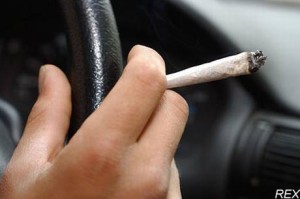The Boston Globe reports a new study that shows more teens are driving stoned on marijuana than driving drunk. This isn’t a completely surprising statistic, but it is really as drastic a problem as the article claims?
Is “driving under the influence of pot is just as dangerous as driving drunk”? And is the survey even measuring marijuana “impairment”? How much can you smoke before you are too stoned to drive?
Is the Data That Bad? Is this a Crisis?
The study is from a survey that gathered self-reported data of those who have smoked marijuana and subsequently driven afterward, or took a ride in a car with someone who had smoked.
However, having smoked marijuana is not necessarily the same thing has being legally impaired. You can have one beer, and you are almost certainly physically and completely legally able to operate a vehicle. What about if you take a couple of hits from a joint?
Is Driving High as Bad as Driving Drunk?
 The science on marijuana impairment is really in it’s infancy, so it really depends what you mean by high.
The science on marijuana impairment is really in it’s infancy, so it really depends what you mean by high.
There is no breath test to determine the level of active THC in someone’s bloodstream. And even if there were, the amount of THC that reliably determines impairment is highly questionable.
Some state have determined that a 5 nanograms of THC standard shows impairment, but many experts question whether this is as consistent a signal as the .08% BAC standard. Other states have a zero tolerance standard, which effectively means you can never drive if you smoke.
This article suggests that current field sobriety tests certified by the National Highway and Traffic Safety Administration (NHTSA), used nationwide and here in Massachusetts are not as reliable a test for pot smokers.
“To test whether drivers are high, police conduct field tests such as having a driver walk nine heel-to-toe steps or stand on one leg for 30 seconds. But a 2012 study suggests that only 30 percent of drivers who have smoked marijuana fail such a field test, compared to nearly 90 percent of drunk drivers.”
Or, it could just mean that smoking some weed doesn’t impair you nearly as much as a bunch of drinks. Again, we are comparing people we know to be above the legal limit for alcohol with … what? having smoked how much? Or how much THC detected in the bloodstream?
Even the NHTSA says “It is difficult to establish a relationship between a person’s THC blood or plasma concentration and performance impairing effects”
A Trend Worth Watching
For underage users, there is little doubt that compared to alcohol, marijuana is easier to get, easier to conceal, and easier to carry. And none of this is likely to change if we legalize marijuana use for adults. So it makes sense than this could be an issue in the future.
The existing DUI laws do apply to marijuana. But proving “impairment” remains more of a judgement call.
And when and if there is a legitimate test for psychoactive hydroxy-THC, the state could pass a zero-tolerance law for underage drivers.
But if marijuana legalization is the future, and Massachusetts passes a Colorado-style law in a couple of years, these issues will certainly be revisited and part of the mix.


There are so many interesting questions to be resolved over “driving while high” laws.
Can you smoke a little and not be legally impaired? Like having 1 or two beers?
What is a legitimate scientific standard of impairment comparable to .08% BAC? Is there one?
Are there accurate tests that police can give that can measure THC in the bloodstream? Can it distinguish between psychoactive hydoxy-THC and inactive carboxy-THC?
If marijuana doesn’t impact dexterity and coordination as alcohol does, will new field sobriety tests be developed that better measure attention span or other ways in which a high person might be too impaired to drive?